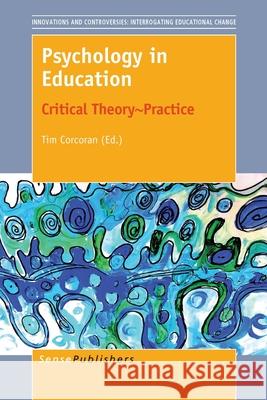Psychology in Education : Critical Theory~Practice » książka
Psychology in Education : Critical Theory~Practice
ISBN-13: 9789462095656 / Angielski / Twarda / 2014 / 220 str.
Psychology in Education : Critical Theory~Practice
ISBN-13: 9789462095656 / Angielski / Twarda / 2014 / 220 str.
(netto: 420,89 VAT: 5%)
Najniższa cena z 30 dni: 423,64
ok. 22 dni roboczych.
Darmowa dostawa!
Psychology's contribution to education has produced a persuasive and burgeoning literature willing to measure (e.g. intelligence quotients), categorise (e.g. learning and/or behavioural diffi culties) and pathologise (e.g. psychiatric disorders) students across learning contexts. Practices like these pervade relationships existing between psychology and education because they share in common certain views of people and the worlds in which they learn. There is however increased acknowledgement that contemporary practice demands alternate ways of working. As learning communities and educators endeavour to make a difference in peoples' lives, they are critically questioning how their use of psychology in education constitutes future possibilities for personhood and psychosocial action. In this book, a group of respected international scholars examine controversies presently facing the enduring relationship between psychology and education. The book will appeal to readers who are interested in the innovative development and application of psychological theories and practices in/to education. The book will be of interest to transnational audiences and is accessible to scholars and students in disciplines including psychology, education, sociology, social work, youth studies, public and allied health. The volume includes contributions from: Tom Billington, Christopher Boyle, Lise Bird Claiborne, Tim Corcoran, Greg Goodman, Jack Martin, Athanasios Marvakis and Ioanna Petritsi, Jace Pillay, Isaac Prilleltensky, Anna Stetsenko, Jeff Sugarman and Stephen Vassallo with a Foreword by Ben Bradley. Tim Corcoran is Senior Research Fellow and Senior Lecturer in Critical Psychology at The Victoria Institute, Victoria University, Melbourne, Australia. He has extensive experience in educational psychology both as a school psychologist and researcher/ academic. His work has involved teaching, research and professional practice in Australia, the UK, Singapore and Iraq.
Psychologys contribution to education has produced a persuasive and burgeoningliterature willing to measure (e.g. intelligence quotients), categorise (e.g. learningand/or behavioural diffi culties) and pathologise (e.g. psychiatric disorders) studentsacross learning contexts. Practices like these pervade relationships existing betweenpsychology and education because they share in common certain views of people andthe worlds in which they learn. There is however increased acknowledgement thatcontemporary practice demands alternate ways of working. As learning communitiesand educators endeavour to make a difference in peoples lives, they are criticallyquestioning how their use of psychology in education constitutes future possibilities forpersonhood and psychosocial action. In this book, a group of respected internationalscholars examine controversies presently facing the enduring relationship betweenpsychology and education. The book will appeal to readers who are interested in theinnovative development and application of psychological theories and practices in/toeducation. The book will be of interest to transnational audiences and is accessible toscholars and students in disciplines including psychology, education, sociology, socialwork, youth studies, public and allied health.The volume includes contributions from: Tom Billington, Christopher Boyle, Lise BirdClaiborne, Tim Corcoran, Greg Goodman, Jack Martin, Athanasios Marvakis and IoannaPetritsi, Jace Pillay, Isaac Prilleltensky, Anna Stetsenko, Jeff Sugarman and StephenVassallo with a Foreword by Ben Bradley.Tim Corcoran is Senior Research Fellow and Senior Lecturer in Critical Psychologyat The Victoria Institute, Victoria University, Melbourne, Australia. He has extensiveexperience in educational psychology both as a school psychologist and researcher/academic. His work has involved teaching, research and professional practice inAustralia, the UK, Singapore and Iraq.











